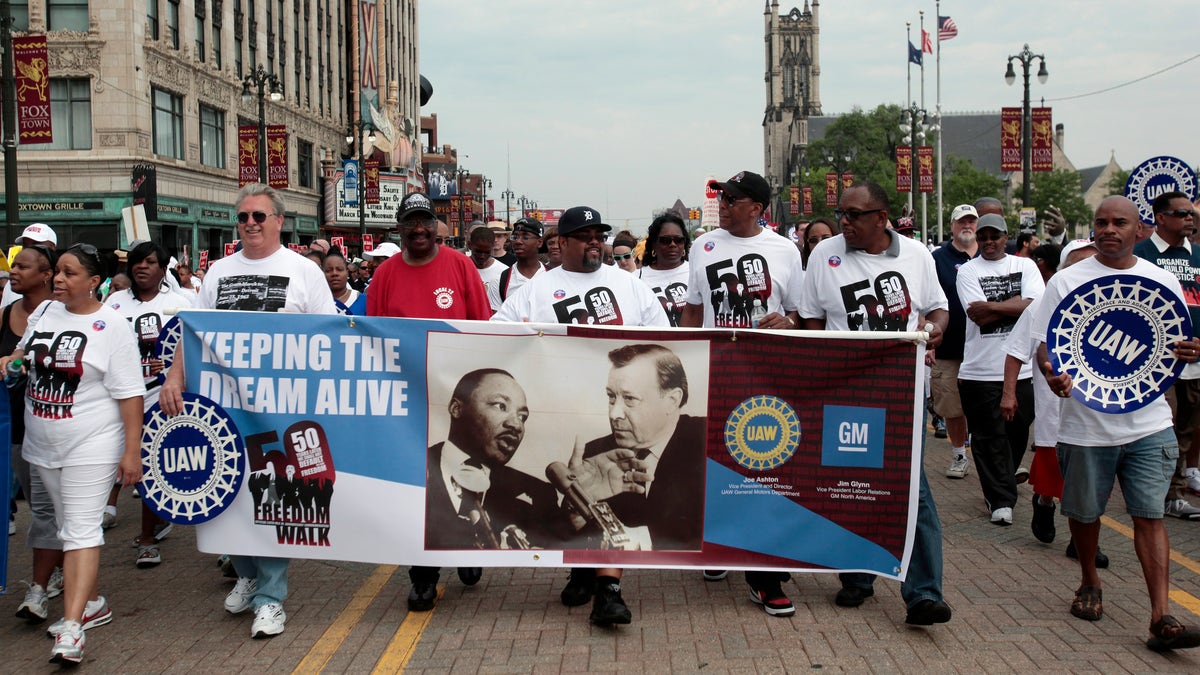
UAW union members carry a banner showing Martin Luther King Jr and labor leader Walter Reuther as they march down Woodward Avenue during the 50th Anniversary Commemorative Freedom Walk in Detroit, Michigan. (REUTERS)
Intimidation is an ugly word.
It is even an uglier practice. Yet that is exactly what the United Auto Workers union is doing in General Motors plants in right to work states Kansas and Tennessee.
The intimidation is in the guise of producing so-called scab lists to alert union workers about which of their colleagues have exercised their legal right to choose not to be a member.
These scab lists give out the non-union worker’s personal information as well as where he or she works in the plant, encouraging work place harassment.
The Washington Free Beacon describes the plight of one Tennessee GM worker who opted not to join in the union. Upon publication of the list at his plant, “he was soon approached by a number of union members who engaged in harassment name calling…”
Big Labor has always relied upon coercing workers to join, and that is the heart of the closed shop system that ruled in Detroit. Under that system, if a worker wanted a job on a Detroit assembly line, he or she had to join the UAW. It was a case of no union dues, no job. It was that simple.
This forced dues payment system swelled the UAW’s coffers when there were just the Big Three major automakers and Detroit was the center of the car manufacturing universe.
A combination of automobile imports and the later decision by manufacturers around the world to build plants in states like Kansas and Tennessee, carved into both the U.S. manufacturers market share, but also the dues payments that were the UAW’s life blood.
To show just how bad things have become for the once robust union, in 2002 U.S. Department of Labor figures reveal that the UAW enjoyed a membership of 702,000. Now, compare that to a 2013 membership of 391,000. That's a 44 percent drop in just eleven years.
Exacerbating the UAW’s shrinking membership problem, the state of Michigan in late 2012 passed right to work legislation freeing workers from being coerced into paying dues as well – effectively putting a knife to the throat of the UAW’s forced membership business model.
Desperate times lead to desperate measures and these latest blatant attempts to coerce workers into “voluntarily” joining the UAW are not truly aimed at the few thousand total members in Kansas and Tennessee, but are designed to act as a warning shot to anyone in Michigan who might be reconsidering their membership.
This collapse in their dues paying membership explains why the UAW leadership cannot afford to allow individual workers to have the right to choose to be in their union. If they hope to hold onto some semblance of the power that their 1950s predecessor Walter Reuther enjoyed, they can't afford to let workers ponder whether or not they want to to continue to pay the leaders' salaries
Over the years, unions have learned that they fail when forced to compete for workers dollars by demonstrating real value,and rather than compete for worker’s loyalty, the UAW instead has reached back into its violent past.
With its decision to engage in workplace bullying in the hopes of driving some to quit and others to acquiesce, the UAW is acknowledging that their only hope of survival is through slashed tires and physical threats.
This devolution is the death rattle of a union which cannot make a convincing case for membership to 21st century American workers as witnessed by votes against them in plant after plant throughout the South.
It is incumbent upon law enforcement officials to enforce workplace safety laws to protect the rights of workers at these plants. Failure of officials to act to protect their citizen’s rights against UAW intimidation would send a signal that workplace laws don’t apply to labor unions, and that would be to the detriment of the entire workforce.
In the United States, approximately 93 percent of private sector workers do not belong to labor unions.
It is time for law enforcement to stand up and protect the rights of the overwhelming majority, and end the UAW’s unacceptable workplace bullying.
